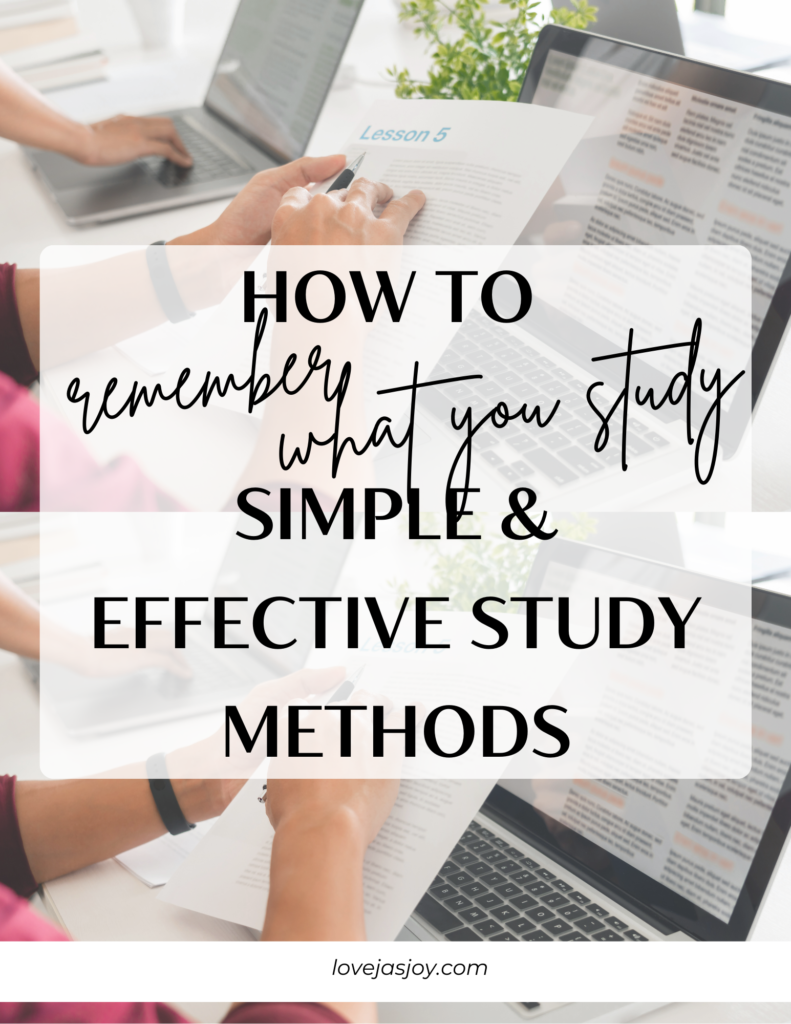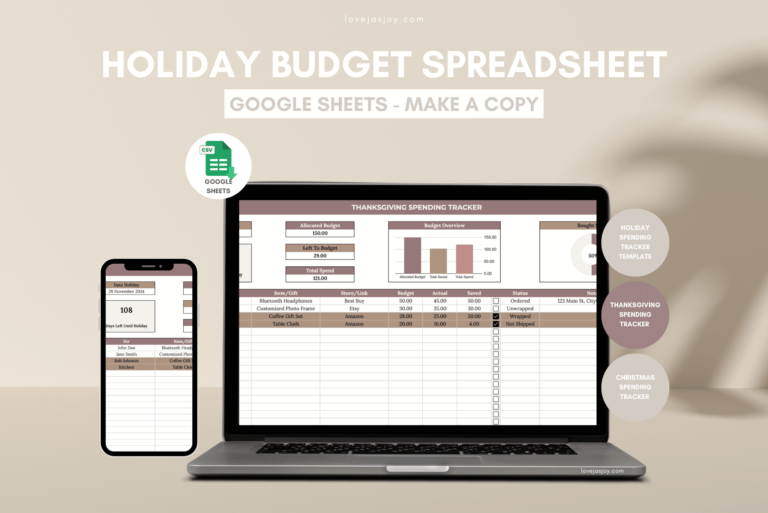How to Remember What You Study: Simple and Effective Study Methods + Aesthetic Supplies

Disclaimer
Please note that this blog post may contain affiliate links to products or services from third-party websites. The information provided in this blog post is based our own personal experiences, research, and opinions. By reading this blog post, you acknowledge and agree to the terms of this disclaimer. Read our full disclaimer page. If you have any concerns or questions, please feel free to contact us.
College! One of the most difficult things to conquer in college is studying. Maybe you can relate with me and wish you had a photographic memory that lets you remember everything you see and read, in an instant. Well, even though we do not have photographic memory, we can still be successful in storing a great amount of knowledge for our exams by using effective methods. So, want to know how to remember what you study to help you ace your classes? Plus receive more beneficial tips that will help you during your study sessions? We got you covered.
WITH THAT SAID, HERE IS HOW TO REMEMBER WHAT YOU STUDY: SIMPLE AND EFFECTIVE STUDY METHODS + AESTHETIC SUPPLIES!
Table of Contents
Listen to advice and accept instruction, that you may gain wisdom in the future.
Proverbs 19:20 Tweet
Join "Love College Scoops"!
Effective study methods
how to remember what you study method 1
Feynman Technique
This technique is named after the renowned physicist Richard Feynman, and is all about understanding concepts to their core.
- Start by picking a concept you wish to grasp.
- Write it down and attempt to explain it as though you were teaching a fifth-grader. Doing this pushes you to simplify and really get to the heart of the topic.
- Stumbled or stuck? Revisit your study materials. Then, refine your explanation.
Feynman technique not only ensures you genuinely understand a topic, but it also highlights areas that might need a tad more study time. Altogether, it’s like having a mini-teacher’s test before the real deal, making sure you are ready and confident. The Feynman Technique is less about rote memorization and more about true comprehension, and in the world of effective studying, that’s a game-changer.
how to remember what you study method 2
Leitner System
Flashcards are a tried-and-true study companion, but the Leitner System takes them to the next level. This system is also named after someone, a German scientist Sebastian Leitner in the 1970s. This technique is a spaced repetition learning strategy.
- Grab a set of flashcards and organize them into a series of boxes (or virtual decks if you’re digital).
- As you study, cards you know move to the next box, while those you struggle with remain or move backward.
- Each box has a different review frequency. For instance, Box 1 might be daily, while Box 3 could be weekly.
Using this technique allows you to consistently review the content you’re struggling with and space out reviews of what you know. This enables you to actively reinforce your learning. It targets your weak spots while ensuring the bulk of your time isn’t wasted on information you’ve already mastered. It is most definitely an effective study method that makes good use of your time.
how to remember what you study method 3
Pomodoro Technique
Time is of the essence when it comes to effective studying, and the Pomodoro Technique is here to ensure you make the most of it. Fun fact, it is named after the Italian word for “tomato” and this method revolves around breaking your study time into bite-sized, focused intervals.
- Start by setting a timer for 25 minutes (or any length of time that best suits you)
Immerse yourself in your study material. No distractions, just pure focus. - When the timer rings, take a short 5-minute break (or ⅕ of the time you set the timer to) to recharge.
- Repeat this process, and after four Pomodoros, treat yourself to a longer 15-30 minute break.
These short bursts of concentrated study help to maximize your retention and maintain high levels of focus. Having regular breaks prevents burnout and keeps your mind fresh. It can transform hours of potential procrastination into productive study sessions.
how to remember what you study method 4
Blurting Method (Modified)
Have you ever read through a textbook or lecture notes, only to realize that your mind has wandered and you haven’t retained a thing? I’m in the same boat as you. Fortunately for us, the Blurting Method is designed to combat passive reading and boost engagement during your study sessions.
- Pick your material to read.
- Set a timer for 25 minutes.
- Anytime a thought, question, or related idea comes to mind, write it down immediately on a notepad or sticky note.
- As soon as the timer goes off, write down a summary of all of the information you can remember.
- Review your summary and notes, compare and contrast it with your study material and highlight anything you may have missed or desire to review.
Repeat until you have a good understanding of your material.
These “blurts” help to actively engage your brain, forcing it to process and relate to the information more deeply. It helps to reinforce connections and deepen understanding.
how to remember what you study method 5
Mnemonic Technique
Mnemonics are incredibly effective! It transforms complicated or unfamiliar information into easily recallable patterns.
Common techniques within the mnemonic umbrella include rhymes, acronyms, visual imagery, and story-telling. For instance, remember the classic “PEMDAS” (Parentheses, Exponents, Multiplication, Division, Addition, Subtraction) from math class? That’s a mnemonic acronym! Another example is remembering or creating your password: iH10C@ma, which means “i Have 10 Cats at my apartment.” Cool, right?
- Start by identifying the tricky data you need to memorize.
- Choose a mnemonic method that resonates with you, and craft a personal cue.
You’ll be amazed at how this study method not only simplifies complex data but also significantly improves retention and recall. It is a fun, creative way to ace your exams, presentations, and it generally makes the learning journey more engaging and rewarding. You will be able to transform complicated material into memorable formats, making it more easy to recall.
how to remember what you study method 6
Multisensory Technique
The Multisensory Technique is an approach that helps you to understand and retain information by involving more than one sensory method. It is like targeting multiple muscle groups using a single exercise aka compound exercises (e.g. burpees). By using visual, auditory, kinesthetic, and sometimes even tactile methods, this technique offers a holistic learning experience.
- Start by identifying your primary learning style and then pair it with one or two others. For instance, if you’re a visual learner, add auditory elements like audio notes.
- Change it up throughout your study sessions or until something sticks.
Using this study method allows you to process information on a deeper level and is more likely to be stored in long-term memory. Also, incorporating multiple senses into your studying activates more areas of your brain, strengthening memory retention. Overall, it enhances comprehension and makes learning more engaging and memorable.

VALUABLE TIPS FOR COLLEGE STUDENTS
These tips are valuable and beneficial to know as a college student! Not just first years, but for sophomore, junior and senior too. We aim to aid your college journey and make it less of a struggle.
How to Focus on Studies Tips
How to Focus on Studies Tip 1
Take Intelligent Breaks
No matter what technique you are using, taking breaks is crucial for maintaining optimal focus. However, it’s important these breaks are constructive.
Instead of mindlessly scrolling on your phone, take a walk, stretch, or engage in a quick, unrelated activity.
Benefits: This resets your mind, reduces study fatigue, and can actually boost memory consolidation.
How to Focus on Studies Tip 2
Use Your Hands
Manipulating information physically can help retention. This could mean writing notes by hand, using flashcards, or physically teaching someone else.
Benefits: Helps with strengthening memory retention.
How to Focus on Studies Tip 3
Make it a Game
Gamification of learning involves turning study sessions into games. Use apps like Quizlet or create your own quiz games with peers.
Benefits: Makes learning fun, and competitive elements can boost motivation and recall.
How to Focus on Studies Tip 4
Verbalize and Record
Talking out loud can reinforce memory. Read your notes aloud, explain concepts to yourself or others, or record and playback your explanations.
Benefits: The act of verbalizing reinforces neural pathways, aiding retention.
How to Focus on Studies Tip 5
Have an Organized Space
A tidy, dedicated study space can significantly improve concentration. Ensure your study area is clean, free from distractions, and has all the materials you need.
Benefits: A designated, organized space reduces procrastination triggers and boosts focus.
How to Focus on Studies Tip 6
Study in Different Areas
Changing your study environment can improve memory recall. Rotate between the library, coffee shops, and different parts of your home.
Benefits: Different environments can trigger different memory cues, aiding in better overall retention.

WORK SCHOOL LIFE BALANCE
These are tried-and-true strategies that helped hundreds of students balance work school and person life. I can honestly say that these methods help me too. Use these strategies to prevent burnout, succeed in your pursuits and more!
Aesthetic School Supplies Amazon
Best Books on How to Study Effectively
- Optimal exam day strategies – even if you haven’t crammed enough
- How to make the most of your classroom time by being less passive
- Your perfect study environment to absorb info
- Convenient and easy memory techniques to memorize anything
- What an exam and class postmortem are and how they can help you
- How memory works,
How to be able to stay focused for hours without getting distracted, - Best tools for remembering,
The most advanced tips for taking notes, synthesizing and reorganizing study material, - A revolutionary study method used every day by the world’s best students,
- And much, much more.
- The 3 bad habits that keep you from easily remembering important information
- How to combine your long-term memory and short-term memory to create instant recall for tests, presentations and important projects
- The simple, invisible mental technique for remembering names without social awkwardness or anxiety
- And much more!
That is everything you need on how to remember what you study + how to focus on studies tips + aesthetic school supplies amazon + best books on how to study effectively! Wow! We touched so many things in this post.
These tried and true study methods and tips will help you immensely in your college journey. Application may be difficult at first, but keep going because consistency builds good study habits. Discipline yourself to guarantee success as a college student.
We are in this together! Let’s keep on keeping on, knowing greater things are to come. We both got this!
love, Jas Joy
Other Posts You May Like
Related Topics



A Payday Routine: How to Budget Your Paycheck Like a Financial Expert











